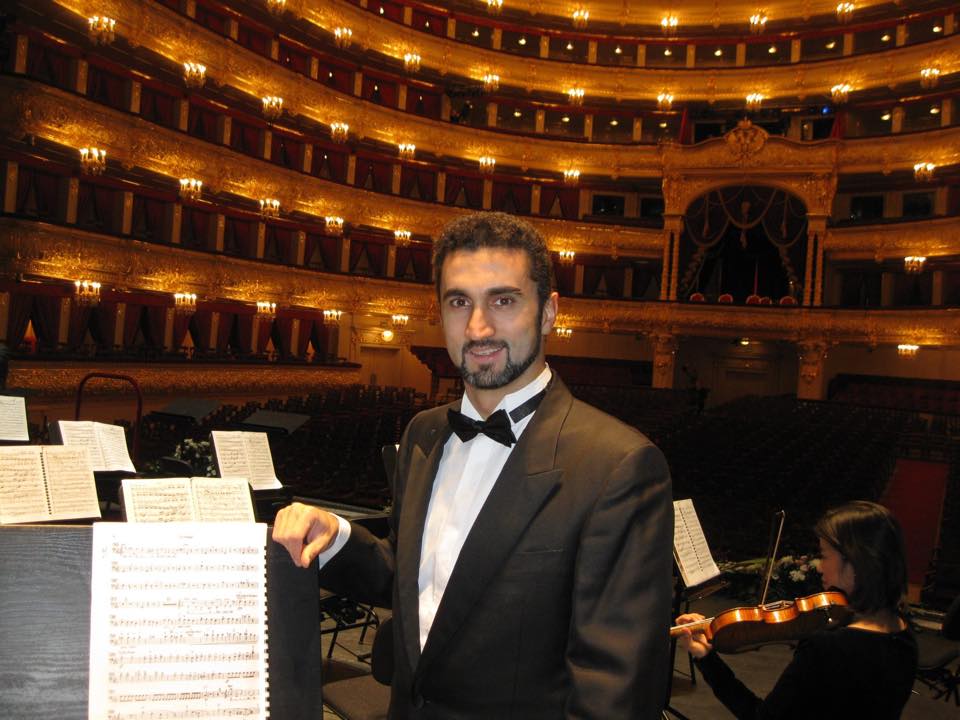Source: www.timesheraldonline.com
By Andrew Gilbert Correspondent | POSTED: 08/25/15
For any young tenor, reaching the hallowed stage of Italy’s La Scala is an exceptional accomplishment. But for Ramtin Ghazavi, the journey from Iran to Milan is a story of defying extraordinary odds and unrelenting discrimination.
The Islamic revolution that swept away the repressive, Western-oriented government of the Shah in 1979 takes a dim view of most musical forms, opera not excepted. There are no conservatories focusing on Western classical music in Iran, and the once renowned Tehran Symphony Orchestra is rarely heard in public.
“Most of the Iranian population doesn’t even know about the art of the opera, so there are not many people that appreciate the fact that I’m the first Iranian tenor to sing on the stage of the most famous opera house of the world,” wrote Ghazavi as part of a recent email exchange. He makes his U.S. debut Saturday at Le Petit Trianon with Austrian-Iranian pianist/conductor Hooman Khalatbari in a concert presented by Diaspora Arts Connection.
Born the year after the revolution, Ghazavi had to overcome far more than a lack of musical resources to pursue his interest in European classical music. As a member of the Baha’i faith, which is considered heretical by Iran’s Shiite government, Ghazavi was barred from many educational and economic opportunities.
According to United Nations reports, the Baha’is, Iran’s largest non-Muslim religious minority, are subject to summary arrest, imprisonment and torture. Despite its tenuous position, the faith originated in 19th century Persia and the beleaguered Baha’i community has deep Iranian roots.
Artistically inclined, Ghazavi studied Persian classical music as a child. In his midteens a friend who played guitar introduced him to Western classical music, which led to piano studies and a fruitless search for a vocal teacher.
“The Internet wasn’t like what it is today, so I had no access to YouTube or other ways to find and listen to the music easily,” Ghazavi wrote. “But I had some audio and videotapes of Pavarotti and Placido Domingo.”
Ghazavi’s life took a sudden turn when an Italian tourist happened to hear him singing Scarlatti’s “Pieta, Signore,” and helped pave his way to study opera in Italy in 2003. After two years at the Conservatory of Como, he successfully auditioned for the elite Milan Conservatory. Immersing himself in music by day and working at Ikea by night, he was a standout student who earned a spot in the choir at La Scala.
By the time he graduated in 2008, Ghazavi had gained enough recognition to make his debut in Alban Berg’s “Wozzeck,” directed by Jrgen Flimm. Other high-profile roles quickly followed, including a televised performance of Leonard Bernstein’s “Chichester Psalms” and a La Scala production of “La Boheme” conducted by Gustavo Dudamel and directed by Franco Zeffirelli.
In 2012 he released his first album, “Les Roses d’Isfahan,” featuring the ethereal Gabriel Faur composition named after Isfahan, the ancient Iranian city where Ghazavi was born. It’s a song he’s never had the opportunity to perform publicly in his homeland. “I can’t perform and work in Iran because of my religion,” Ghazavi wrote.
He did manage to pull off a Tehran recital in the home of the Italian ambassador in 2013, and in collaboration with the Italian Embassy, he launched the first opera master class in the city’s Italian school.
Given the minuscule number of Iranian musicians in classical music, it’s no surprise that Ghazavi and Khalatbari found each other in Europe. The principal conductor of the Prague Metropolitan Philharmonic Orchestra, Khalatbari is also the founder, music director and conductor of northern Austria’s Kirchstetten Castle International Music Festival.
At Le Petit Trianon, they’re presenting a two-part program that opens with Neapolitan songs and beloved Verdi and Puccini arias. The second half focuses on the largely lost repertoire by Iranian composers who “wrote with European classical music principles, introducing the most beautiful themes of folklore and popular Iranian songs,” Ghazavi wrote.
In the middle of the last century, Iranian composers steeped in Western forms such as Rubik Gregorian, Hossein Nassehi, Ruhollah Khaleqi, Samin Baghtcheban and Hossein Dehlavi created new works drawing on the epic verse of foundational Persian poet Ferdowsi and Persian folklore.
“Unfortunately, this repertory has been forgotten,” Ghazavi wrote. “This recital is almost the first performance that tries to renew the culture of opera singing in the Persian language that also has some ancient roots in the Persian culture.”
Contact Andrew Gilbert at [email protected].
Hooman Khalatbari and Ramtin Ghazavi
When: 7 p.m. Saturday
Where: Le Petit Trianon, 72 N. Fifth St., San Jose
Tickets: www.trianontheatre.com, www.facebook.com/DiasporaArtsConnection

Leave a Reply